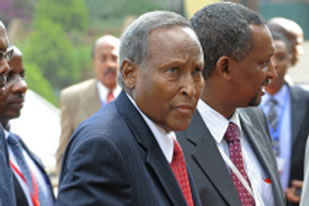fiogf49gjkf0d

October 29, 2008
 |
| Abdullahi Yusuf and his government are said to have little political influence in Somalia [AFP] |
Somali leaders have been urged to form a new cabinet within two weeks in an effort to restore peace in the strife-torn country.
Five presidents attending a regional summit in Nairobi, Kenya, said on Wednesday that members of the Transitional Federal Government (TFG) should appoint a cabinet within 15 days.
The statement from the Inter-Governmental Authority on Regional Development (Igad) is likely to disappoint Somalis who had been hoping for an end to the years of violence and instability that has blighted their country.
The Somali interim government was criticised by Igad, the body that helped to create it four years ago, for failing to resolve the longstanding political deadlock.
Abdullahi Yusuf, the Somali president, and Nur Hassan Hussein, his prime minister, had previously signed an agreement in Addis Ababa, the Ethiopian capital, aimed at ending months of infighting.
But political deadlock has persisted, stalling government and parlimentary operations.
Mwai Kibaki, the Kenyan president, said: "It is necessary that [the deadlock] is overcome for positive progress to be made.
"I, therefore, call upon all the Somali leaders to put aside their differences for the sake of peace, stability and the welfare of their people."
Disappointment
Al Jazeera's Mohammed Adow, reporting from Nairobi, said that the outcome of the meeting may disappoint many people.
"The call to form a new cabinet will be seen as disappointing to many people because it effectively gives the green light for the TFG to keep going the way they are," he said.
"There has been no significant resolutions put forward at the summit in a bid to end years of conflict in Somalia."
Meles Zenawi, the Ethiopian prime minister, whose forces are battling Islamist fighters in Mogadishu, the capital, warned against neglecting Somalia.
"The transitional federal institutions are in paralysis. It is high time that this situation was addressed ... and in all seriousness," he said.
"Somalia has not been given required attention either by the United Nations or the international community."
Seyoum Mesfin, the Somali foreign minister, said that Yusuf and his successive prime ministers had "not managed to create any institutions of governance to speak of" since they came to power in December 2006.
"The continuing feud within the leadership ... had contributed to the paralysis of the TFG," he said.
Ethiopian forces helped bring the TFG to power after ousting fighters loyal to the Islamic Courts' Union (ICU) in 2006.
The TFG was formally established in 2004, but its influence did not extend beyond the town of Baidoa until the Ethiopian army entered Somalia nearly two years ago.
Charter to expire
Somalia's transitional federal charter expires next year when a new constitution is to be drafted and elections held, although there is widespread scepticism over whether polls can take place.
Despite pledges from some African governments, only Uganda has contributed significant numbers to a peacekeeping force in the country.
On Sunday, a UN-sponsored peace process in Djibouti announced that a deal had been signed by the transitional government and the Alliance for the Reliberation of Somalia, the main Islamist-dominated opposition group.
The agreement provides for a ceasefire and an Ethiopian troop pullback to begin next month, with security responsibilities gradually handed over to Somali police until a UN peacekeeping force is deployed.
The main Islamist group, which now controls most of southern and central Somalia, rejected the announcement.
The al-Shabab accuses Addis Ababa of occupying Somalia and has refused to negotiate before a full withdrawal is completed.
Source: AlJazeera, Oct 29, 2008